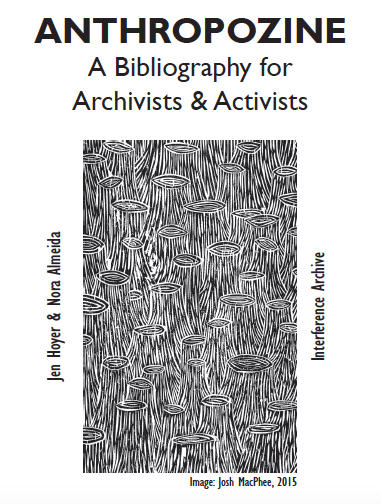Anthropozine!
May 14, 2017

For the May 2017 colloquium, Libraries and Archives in the Anthropocene, Interference Archive volunteers Nora Almeida and Jen Hoyer gave a talk and also put together a zine — the Anthropozine, obviously — of their annotated bibliography on reframing the ways we think about the anthropocene and the role of archives in this era.
Download the zine at https://interferencearchive.org/wp-content/uploads/AnthropoZINE.pdf
Printing instructions: select multiple page printing, two pages per sheet horizontally on a landscape orientation. Print on both sides of the paper, flipped on the SHORT side.
From the zine:
What is the Anthropozine?
In the process of thinking about the relationship between archives and the anthropocene, we’ve done a lot of reading. This annotated bibliography is our way of sharing some of that reading, and some of our reflections on it, with you.
We’ve divided bibliographic entries into two sections. First, our reading about the anthropocene led us to reflect on problems with narratives that have come to define the anthropocene as an abstract and purely biophysical phenomenon. We have sought out disparate perspectives and alternative narratives that consider the anthropocene (and solutions to environmental crisis) in relation to complex social, cultural, geopolitical, historical, economic, and technological factors.
Considering how alternative narratives are documented and shared led us to readings about archives. We found that archives have been limited by their framing as: representative of the past, comprehensive, apolitical, static, and fragile. In light of this, we reflected on the affective impact of archives in communities and ways archives can defy cultural expectations, foster dialogue, and provide access to alternative narratives. Finally, we’ve explored archives as systems that have the capacity to shift power differentials, instigate cultural production, and promote human agency and social interaction.